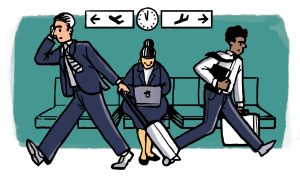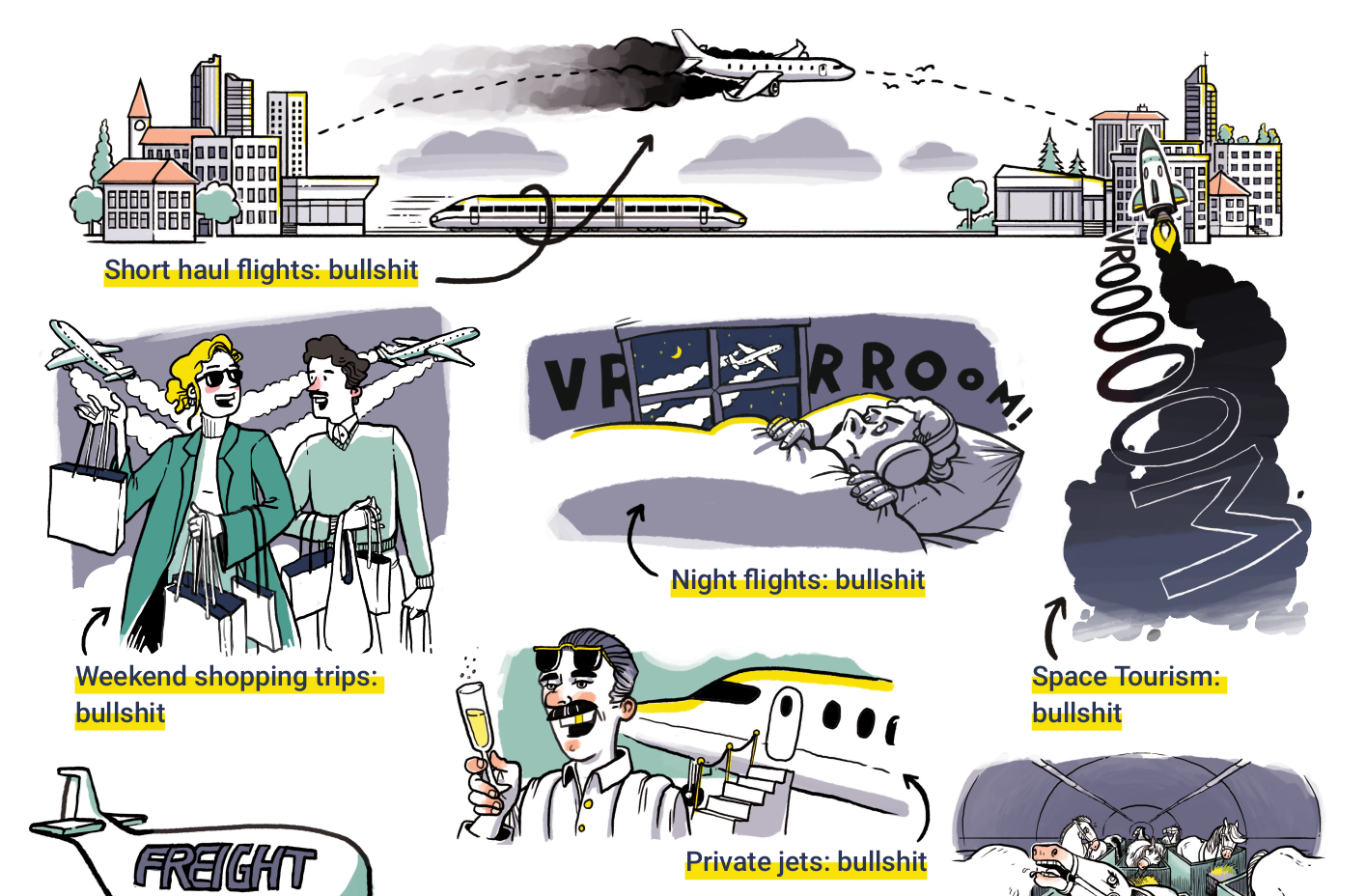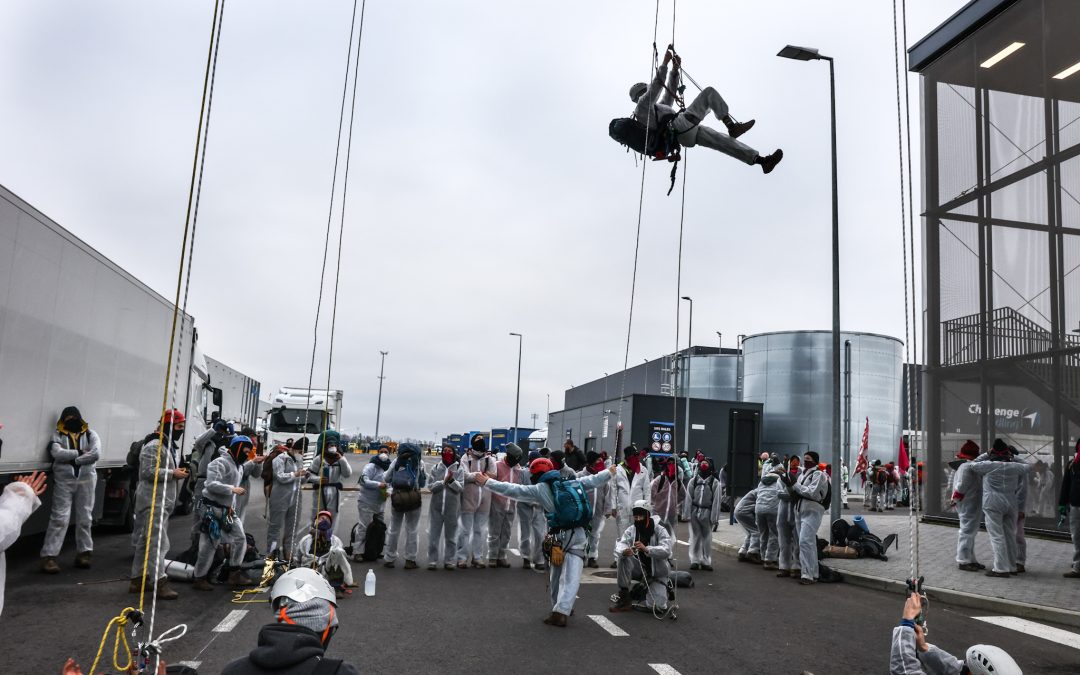By now, it is well known that flying is bad for the climate. What’s not clear enough is that it is mostly a problem of inequality: flying is essentially a luxury activity, and in many cases downright obscene. Analogous to the concept of bullshit jobs [1] – jobs that are meaningless and harmful for society – we could therefore rightly speak of bullshit flights. Our definition: bullshit flights are unnecessary, frivolous and unfair – and should be stopped immediately. But who defines what bullshit flights are, and what flights are still legitimate to take, despite the threat of climate breakdown? And what are the consequences? This article summarizes the results of a Stay Grounded survey on bullshit flights, and poses some questions about the future of our mobility system.
 Air travel is the most unequal form of mobility. Only 1% of the world’s population cause 50% of commercial aviation emissions, while more than 80% of the population have never set foot on an aeroplane [2]. Some very wealthy frequent flyers cause immense climate harm. Indeed, “the jet-setting habits of Bill Gates and Paris Hilton mean that they produce an astonishing 10,000 times more carbon emissions from flying than the average person”, found a scientific study. Even worse: the new hype of space tourism. A single 11-minute space flight amounts to at least 75 tonnes of emissions. This exceeds the average per capita lifetime emissions of the poorest billion people on Earth.
Air travel is the most unequal form of mobility. Only 1% of the world’s population cause 50% of commercial aviation emissions, while more than 80% of the population have never set foot on an aeroplane [2]. Some very wealthy frequent flyers cause immense climate harm. Indeed, “the jet-setting habits of Bill Gates and Paris Hilton mean that they produce an astonishing 10,000 times more carbon emissions from flying than the average person”, found a scientific study. Even worse: the new hype of space tourism. A single 11-minute space flight amounts to at least 75 tonnes of emissions. This exceeds the average per capita lifetime emissions of the poorest billion people on Earth.
So while many might agree that space flights are absolutely not legitimate in times of climate crisis, how about private jets? Or flights transporting animals – like horses? Or a weekend shopping trip for 22 €? But how about a migrant flying back to see their family in Turkey once a year, with a very limited budget and time schedule due to difficult working conditions? What about refugees from Afghanistan, who need to urgently leave the country – and might not be allowed to board an airplane?
The time is ripe to start a discussion around which flights are legitimate, and which are simply unjust and unnecessary “bullshit flights”.
What are bullshit flights?
We made some surveys in 2021, and evaluated the responses of about 2000 people [3]. Here is an overview of the answers:


Apart from the quantitative answers, we also got some very good comments. For example, we realized that the question about night flights was not well understood. Night flights are flights landing or departing during the night, leading to severe noise and health problems for residents – and several airports already have bans on these flights.
 Also, it might be an issue to call deportation flights “bullshit”: they are actually not only unjust and unnecessary, they are cruel and can lead to death and human rights violations.
Also, it might be an issue to call deportation flights “bullshit”: they are actually not only unjust and unnecessary, they are cruel and can lead to death and human rights violations.
“Regarding Deportation flights, I think the bigger issue is deportation itself, and not the flights. Those people go through miserable circumstances, and if on top we need to deport them in lengthy trips on boat, how does that help them? The issue to me is why do we deport them?” – Survey Respondent
Same with military flights, where the emissions might not be the most negative impact. However, military flights for disaster relief might be totally necessary. So the question whether military flights are legitimate or not might be outside the scope of this article. At the same time, it makes clear how deeply embedded aviation is in our economy and society, and that the discussion about flights touches other topics around injustice that are also important to debate.
Is “bullshit” the right term?
It was also clear that respondents did not necessarily agree with classifying some flights as bullshit.
“Almost all of the options in the list are potentially fun and exciting, and the ability to waste and live and do hedonistic things can be a great feeling that people should be able to have. All these kinds of flights are bad because they damage the climate, but the people doing them may well get a genuine thrill and joy from them.” – Survey Respondent
 It is complicated asking for a reduction of something that is a thrill and joy thing to do. But aren’t there other ways to have fun by other means, like slow travel, less work, more sleep, closer relationships with friends and family? In the end, it is hard to start this discussion on bullshit flights without touching the individual’s lives. The idea is however to link it with the institutional and societal structures behind them – with the economy and power relations that lead to bullshit flights. The power of the aviation industry exists both through a broad consensus that flights are fun, or could be fun if one could afford it, as well as through state subsidies, effective lobbying and greenwashing. It exists due to a lack of alternatives to travel, due to globalized trade, and a growing gap between rich and poor.
It is complicated asking for a reduction of something that is a thrill and joy thing to do. But aren’t there other ways to have fun by other means, like slow travel, less work, more sleep, closer relationships with friends and family? In the end, it is hard to start this discussion on bullshit flights without touching the individual’s lives. The idea is however to link it with the institutional and societal structures behind them – with the economy and power relations that lead to bullshit flights. The power of the aviation industry exists both through a broad consensus that flights are fun, or could be fun if one could afford it, as well as through state subsidies, effective lobbying and greenwashing. It exists due to a lack of alternatives to travel, due to globalized trade, and a growing gap between rich and poor.
So, is the word “bullshit flights” the right one? Does it manage to link the individual flight to the systemic level? Does the term encompass them being unnecessary, frivolous, and unfair? And: does it contain the right amount of provocation to get a debate on the topic started? The answers by our survey respondents were quite different. While many preferred the term “pointless flights”, others made new word proposals:  Frivolous flights, needless flights, nonsense flights, apocalypse or disaster flights, fuck-up-the-planet flights, don’t-need-flights, and many more. Most of them however relate to such flights being either unnecessary, or frivolous, or unfair, or only relate to their climate harm. Some respondents argued that there should be a more serious term for it. However, many others supported the clear framing of bullshit flights, and the surprising number of respondents to our survey made clear that the term catches the attention.
Frivolous flights, needless flights, nonsense flights, apocalypse or disaster flights, fuck-up-the-planet flights, don’t-need-flights, and many more. Most of them however relate to such flights being either unnecessary, or frivolous, or unfair, or only relate to their climate harm. Some respondents argued that there should be a more serious term for it. However, many others supported the clear framing of bullshit flights, and the surprising number of respondents to our survey made clear that the term catches the attention.
And now what?
We might not find the one term that fits all. But we can try it out and see if we can make this term more common – by using it every time we come across a flight that is unfair, frivolous and unnecessary. In the news, in an advertisement, in a conversation… We can then aim at linking this individual flight to a system that supports bullshit flights, that subsidizes the aviation industry, and forgets to target the wealthy super emitters.
We need to reduce air traffic – but we need to do it in an equal and just way. Bullshit flights must be dis-licensed, through cultural change but also through targeted regulation. By cutting short-haul flights and shifting them to ground travel like the railway. By limiting private jets. By banning night flights. By stopping Miles & More programmes that incentivize frequent flying.
This would be a start, and not a bad one. Of course, thinking it through, we must realize that there will not be the one completely fair aviation reduction measure in an unfair world. As long as there is an enormous gap between the global wealthy and poor, and between Global North and South, there will be unfair access to flights. It is therefore important to link our demands on aviation to wider demands for global justice.
What can be done against bullshit flights:
- Order and spread bullshit flight posters and stickers: https://stay-grounded.org/order
- If you’re German speaking, you can play the new Bullshit Flight game from our member “Am Boden bleiben” with family & friends, to start the discussion in a fun and accessible way: https://www.ambodenbleiben.de/bullshitfluegequartett/
- Whenever you come across something you would call a Bullshit Flight, you might want to mention this term – or engage in the discussion on social media, using #BullshitFlights.
- Last but not least: Get active with Stay Grounded or one of our member groups =)
Footnotes:
[1] “Bullshit Jobs: A Theory” is a 2018 book by anthropologist David Graeber that postulates the existence of meaningless jobs and analyzes their societal harm. He contends that over half of societal work is pointless and becomes psychologically destructive.
[2] The 2020 study by Gössling & Humpe finds that air travelers are disproportionately wealthy. E. g. US-households with incomes of US$75,000 or more emitted 13.74 t CO2 per year in transport emissions, while households earning less than US$5,000 emitted 5.5 t CO2. In the UK, the 20% of the most frequent non-business travelers produced 60% of related emissions, with the contribution by the highest income groups (>£40,000 person/year) being 3.5 times greater than that of the lowest income groups (<£10,000 person/year).
[3] To be clear: This was not a scientific study. Stay Grounded spread the survey via it’s newsletter, and asked some questions on Twitter and Telegram – therefore the target group was not very diverse, and also mostly European. It was sent out in English and German, while most respondents were German.



